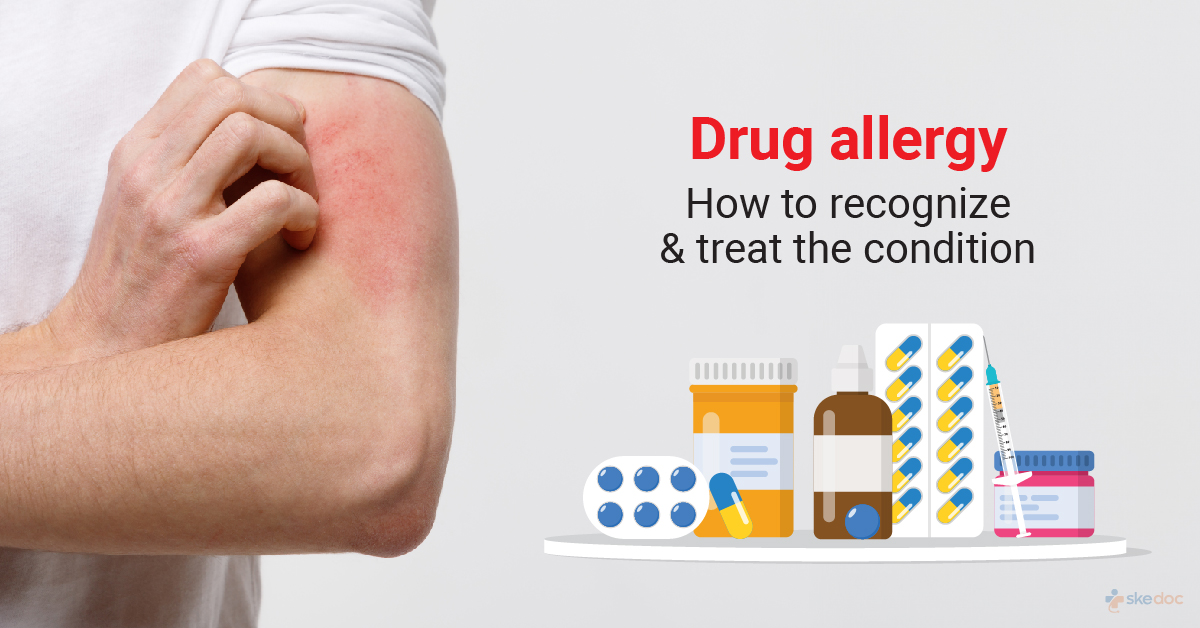Allergy
Blood Diseases
Bone & Joints
Brain
Cancer
Child Care
Cosmetic Surgery
Diabetes
Endocrinology
ENT
Eye
Gen Medicine
General Surgery
Heart
Kidney
Lifestyle
Liver & Digestive
Lung
Men’s Health
Mental health
Physiotherapy
Rheumatology
Skin and hair
Sleep Disorders
Spine
Transplant
Women Health
Thyroid
Vascular Surgery
Drug Allergy

What is Drug Allergy?
Drug allergy is an exaggerated response of the body’s immune system to a drug or a prescription medication. A drug allergy may be seen after oral, intramuscular, or intravenous administration of drugs.
Alternate names
Adverse Drug Reaction / ADRs
Is this condition a medical emergency?
Drug allergies may sometimes be serious and lead to anaphylaxis and would require immediate medical attention.
Causes of drug allergy
A drug allergy is a result of the body’s immune system mistakenly identifying a drug or its components as a harmful substance and subsequently producing antibodies that target it. This leads to an exaggerated response to subsequent exposure to the drug. Any drug can cause an allergic reaction, but some of the drugs that are commonly associated with drug allergies include:
- Antiepileptics or Anti-seizure medications
- Antibiotics such as penicillins, etc
- Antiretrovirals
- NSAIDs
- General Anaesthetics
- Local Anaesthetics
- Chemotherapeutic agents
- Medicines used to treat autoimmune diseases
Some drugs causing pseudo-allergic reactions or reactions that are not caused by the activity of the immune system are:
- Radiocontrast agents
- Opioid analgesics
- Aspirin
Risk factors
The risk factors for drug allergies include:
- A family history of drug allergies
- A history of other allergic diseases such as food or pets
- Extensive use of a drug for a prolonged period
- Altered immune system due to infections such as HIV or Epstein Barr virus
Symptoms & signs
The symptoms and signs associated with drug allergies usually develop within an hour or so after the administration of the drug, and they may include:
- Rash on the skin
- Itching
- Fever
- Hives
- Swelling of the face
- Shortness of breath
If anaphylaxis develops, the symptoms may include:
- Respiratory: Nasal congestion, running nose, swollen tongue, tightening of the throat, wheezing, difficulty breathing, cough, hoarseness of voice.
- Cardiac: Dizziness, weakness, fainting, chest pain, palpitations, fall in blood pressure, weak and rapid pulse.
- Gastrointestinal: Difficulty swallowing, nausea, vomiting, diarrhea, bloating, abdominal cramps or pain, metallic taste.
- Nervous system: Headache, dizziness, blurring of vision, seizures.
Investigations
Investigations to establish a penicillin allergy may include:
- Skin Tests
- Laboratory tests
Diagnosis
A diagnosis of a drug allergy may be established based on the medical history and the results of the investigations.
Drug allergy treatment options
The management of a drug allergy is aimed at addressing the current symptoms of the allergy and enabling the individual to continue taking the drug if it is essential for the management of another condition.
Medical management
Medical management of the current symptoms of a drug allergy may include the following:
- Management of anaphylaxis, if present
- Withdrawal of the drug causing the allergy
- Antihistamines
- Corticosteroids: To reduce inflammation
Management aimed at continuing the usage of the offending drug may include:
- Graded challenge: This involves the administration of the drug in multiple doses, starting with a small dose and increasing it to the desired dose.
- Sensitization: A small dose of the drug is given, and the dose is kept increasing over a few hours to a few days until there is no reaction from the immune system.
Role of Diet/exercise/lifestyle changes/preventive measures
Keeping a note of medications that are being taken and that have been taken in the past and informing health care workers or doctors of possible allergic reactions in the past or a history of allergies in the family may help to prevent drug allergies.
Complications
Some of the complications of drug allergies include:
- Severe anaphylaxis
- Kidney damage
- Cardiovascular damage: Due to eosinophilic carditis
- Serum sickness
- Drug-induced anemia
- Drug rash with eosinophilia and systemic syndrome (DRESS): Skin rash, high white blood cell count, lymph node swelling, and hepatitis
Prognosis
The prognosis for drug allergy is generally good if identified and managed early. Fatal drug reactions do occur but are not very common.
When to contact the doctor or hospital/How to identify the emergency or complications?
If any of the symptoms of a penicillin allergy or anaphylaxis are seen after taking a medication, it is advisable to seek immediate medical attention.
Indications for hospitalization if required
Hospitalization is not required for most drug allergies unless there is anaphylaxis, which would require hospitalization until the individual is stabilized.
Suggested clinical specialists/Departments to consult for this condition
Drug allergies would be attended to by the Emergency Department, an Allergist, and an Immunologist.
Was this article helpful?
YesNo




